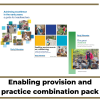DfE launches school-based nursery pilot
The Department for Education (DfE) has today launched a “test and learn” pilot for its planned expansion of school-based nursery provision. Under the scheme, primary
On 10 June, Labour announced their plans for “over three thousand new nursery classes across England to open up access to childcare hours for families”, with “spare classrooms” in schools to be used either for nursery provision delivered by schools, or by PVIs. According to the Guardian, this will include funding of £140m to refurbish classrooms, and will be targeted at “childcare deserts” where there is a shortage of provision.
Update: On 13 June, they launched their manifesto confirming this pledge. Additionally, they pledge to promote numeracy teaching across nurseries and primary schools and mention early communication skills, but only in reference to schools, not nurseries. They pledge to introduce a strategy to reduce child poverty and review the parental leave system. They also commit to improving data sharing among services working with children, including introducing a unique child identifier. They plan to replace Ofsted’s single word judgements with a report card. While there is mention of bringing multi-academy trusts into the inspection system, there is no mention of whether a similar approach would apply to nursery chains. They will review curriculum and assessment in schools, which could open up the possibility of removing the Reception Baseline Assessment.
We welcome any steps that will ensure that high quality early childhood education is available and accessible for children everywhere, and the need for active intervention to address sufficiency issues.
It’s already the case that in the most disadvantaged areas, children are twice as likely to be in school-based nurseries as in the most advantaged areas, so Labour’s proposals fit with a model where maintained provision fills the gaps which are left where other providers can’t or won’t operate. However, this often relies on schools cross-subsidising nursery provision from elsewhere in the budget, which is not viable at a time when school budgets are already under huge pressure. For this policy to work, Labour must also commit to ensuring that hourly funding rates cover the full cost of nursery provision in schools, where staff costs are higher due to higher qualification requirements and national and local pay agreements. Recruitment of appropriately trained early years staff will also be a challenge for expansion of any kind, and a workforce strategy is vital. Labour must also consider the additional costs and practical challenges if it wants school-based nurseries to be open year-round and to fit with parents’ working hours, and the additional expertise needed in primary schools if they are to take in younger children.
To put this proposal in context, there are currently over 16,000 primary schools in England, all of which have reception classes (the final year of the Early Years Foundation Stage). At least 7,500 have a nursery classes as part of the school which are led by teachers. Another 900 have what is called “governor-led provision” where the school governors run a nursery as a separate entity, allowing them to operate on the same staffing model as private and voluntary sector nurseries, led by a staff member with only a Level 3 Early Years Educator qualification, and without a requirement to employ teachers. There will be other primary schools which have a nursery on site run by a private or voluntary sector and not under the direct control of the school.
The Labour proposal appears to allow for any of these options. It is not clear whether it will only be for schools without nursery provision at present, or whether it could allow schools with nurseries to extend their provision, for instance to create a space for 2-year-olds or younger children.
If looking at the capacity of the maintained sector to support younger children, Labour would do well to look at maintained nursery schools. Since the introduction of the entitlement for disadvantaged 2-year-olds, the amount of provision for them in primary schools has only grown very slowly. Just over 1,500 primary schools are providing places for 12,000 disadvantaged 2-year-olds (9.7% of places). However, just 316 maintained nursery schools provide 6,600 places for disadvantaged 2-year olds – 5% of all places nationally. Particularly when it comes to the needs of younger children, maintained nursery schools as early years specialists are far better placed the primary schools to offer the volume and quality of places needed. Crucially, they also have a strong track record of inclusivity, being based primarily in the most disadvantaged areas of the country and taking higher proportions of children with SEND than any other part of the sector.
The Department for Education (DfE) has today launched a “test and learn” pilot for its planned expansion of school-based nursery provision. Under the scheme, primary
Ofsted has today published its response to the “Big Listen” consultation. For the early years, it undertakes to: On the differences between early years and
We welcome the Department for Education’s announcement that the government are moving ahead with their manifesto commitment to scrap single-word Ofsted judgements for schools, effective immediately,
The National Audit Office’s new report, Improving educational outcomes for disadvantaged children, finds that in 2023-24, DfE allocated an estimated £9.2 billion to specifically focus
The letter below sets out our key asks for the next government.
The Conservative Manifesto has promised to extend Family Hubs to all local authorities. This would both extend funding for the 75 local authorities where they
The Lib Dems have published their manifesto, including commitments to incorporate the UN Convention on the Rights of the Child into UK law and to
Today, Friday 17 May, the Early Education and Childcare Coalition (EECC) has launched its new manifesto, with proposals to rescue and reform England’s early education
A report published by the National Audit Office (NAO) today finds that the timetable for the roll-out of the new funded early education and childcare
In response to recent queries about why the latest DfE guidance on providing the early education and childcare entitlements has removed references to additional charges
A new campaign to boost recruitment to the early years sector in England is being launched today by the government. The government press release says:
DfE have issued an update to address the issue of parents wishing to claim their codes for the new entitlements who cannot do so because
The Department for Education has today published its response to the EYFS consultation conducted in the summer. The changes will be implemented from January 2024
For many of us, the path we’ve taken in our careers can often be traced back to the passions and talents of our childhood and
DfE has today launched a consultation on the new funding rates which will apply for 2-year-olds and under 2s when the new entitlements are introduced
The Department for Education has today announced that the extra £204m for early years announced in the budget will be allocated to local authorities as
In a speech today, Kier Starmer will set out Labour’s plans to expand opportunity via five “missions” including “Early years reform – to boost child development with an
The Department for Education (DfE) is currently consulting on proposals to amend the Early Years Foundation Stage. They propose relaxing the requirements around the minimum
by Dr Jo Albin-Clark, Edge Hill University and Dr Nathan Archer, Leeds Beckett University Inspection in the news Being involved in education in England involves
DfE has issued slightly more detail about the planned uplift in the hourly rates for the current and new entitlements, following the announcements in the
The Department for Education (DfE) have published their response to the consultation on potential changes to staff:child ratios. The consultation received responses from nearly 10,000
In today’s budget the Chancellor has confirmed several new measures on early education and childcare: Our analysis The decision to relax the ratios for 2-year-olds
Today, Early Education, the NAHT, NEU and Unison have jointly written an open letter calling on the government to address the shortfall in early years
by Kayla Halls, Early Years Research Fellow at Middlesex University & Mona Sakr, Senior Lecturer in Early Childhood at Middlesex University’ Leaders in the early
Today, teachers from the National Education Union are striking, including many working in nursery and reception classes. In the last week, the Department for Education
by Amanda Ince and Liz Bullough, UCL Institute of Education “I want to be an inspiring leader who can inspire my colleagues in my setting
We welcome the news that our President, Professor Cathy Nutbrown, has been made a Dame in the year’s New Years Honours list. This is much
The government’s latest changes to the early years funding formulae bring two key changes which we pointed out in our response to the consultation would
DfE have today announced the early years funding settlement for 2023-24, which leaves the early years sector struggling on below inflationary increases. While an additional
Ofsted’s latest annual review highlights the impact of recruitment and retention challenges and finds a link between inspection outcomes and the proportion of graduates in
In his Autumn Statement today the Chancellor failed to offer any financial help to an early years sector which is already struggling to stay afloat.
Early Education welcomes the announcement by Bridget Philipson MP, the Shadow Education Secretary, that Labour intends for an expansion of the maintained nursery sector to
by Clarissa Frigerio Why are there so few men teaching in the early years? I have worked in the profession for almost 9 years, and
It could be argued that teachers who move into teaching reception for the first time, face the same challenges as the children themselves as they start in reception.
The tenth early years minister in ten years, Kelly Tolhurst, is now in post. It’s good news that early years is part of a Minister
We urge members to respond to the two DfE consultations on funding and ratios which close on 16 September. For information, you can view the
Comparing figures from January 2022 and January 2020, progress is being made towards previous levels of take up of funded early education. Latest figures from
Early Education welcomes the news that the new National Plan for Music Education has been extended to cover the early years. We are glad to
The Times Education Commission has today published a report which calls for “A significant boost to early years funding targeted at the most vulnerable and
Cathy Nutbrown, President of Early Education The twelve sessions of the May Annual National Conference 2022 left me reflecting on a strong thread which I
Ofsted has today launched a new five-year strategy. Elements of this which affect the early years include commitments to “simplify the regulatory regime for childminders”
We welcome the government’s new Sustainability and climate change strategy for education and children’s services, and that early years is reflected through a range of
External Vacancies Internal Vacancies To advertise here, contact office@early-education.org.uk Organisation and multisite members may advertise vacancies for free as part of the membership package. Download Job advertisement
A survey of maintained nursery schools carried out by Early Education in June 2021 has found increasing demand from children with SEND in the current
The DfE have issued documents to support schools and settings to understand how to report to the Early Years Census in the context of the









Early Education
2 Victoria Square
St Albans
AL1 3TF
T: 01727 884925
E: office@early-education.org.uk